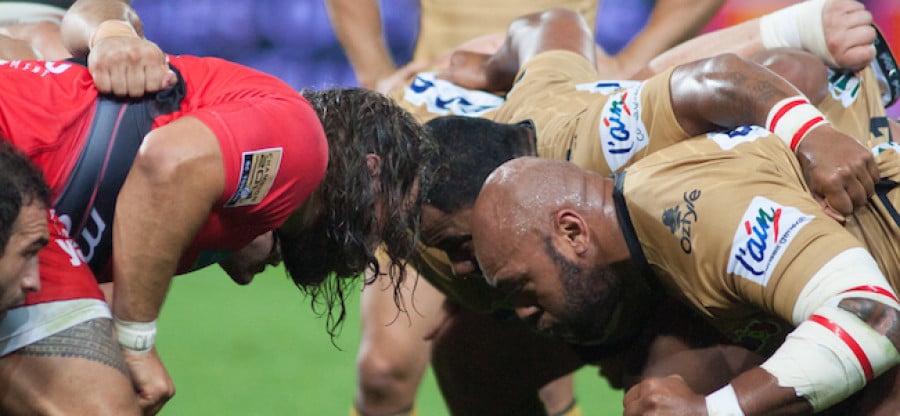Symptom free: will the law strike a knockout blow on concussion in rugby?

As the Six Nations rugby tournament approaches its half way stage, the usual media chatter on who might win go on to win the championship has been substituted by concern over a number of high profile, concussion-related injuries.
Concussive injuries sustained by Wales’ George North in both halves of the opening game against England; the return of Ireland’s Jonathan Sexton against France after a 12-week layoff due to successive head injuries; and Mike Brown’s knock in England’s home game against Italy have been the dominant images1 of Six Nations 2015.
Media comment has largely focused on whether existing medical protocols – suggesting minimum rest periods of 21 days for players – are not being fully enforced such that players are returning to the field of play within mere minutes of suffering an apparently concussive blow. More importantly, a number of sports physicians2 have argued vehemently that even if extant, pitch side concussion protocols in international rugby are adhered to strictly, they are simply not of a standard that sufficiently protects the long term welfare of rugby players.
Risk prevention in elite rugby
The primary duty of care for rugby players’ welfare lies with the sport’s world governing body, World Rugby, and its various national unions. These organisations are, rightly, sensitive to criticism on the matter of head injuries, the incidence of which rose 59 per cent in English rugby in 2013-143 compared to the previous season and thus making concussion the most common match injury for rugby players for the third straight year.
An example of that sensitivity can be seen in Ireland where, in light of what it called “disappointing and inaccurate commentary in the media by individuals with no medical expertise”, the Irish Rugby Football Union (IRFU) took the unprecedented step of issuing a press release on what it called the “medical management”4 of Jonathan Sexton. The IRFU noted that Sexton’s return to play had been sanctioned by independent neurologists in France and Ireland, his club doctors, as well as the Irish and French Rugby Federation’s medical teams.
Similarly, the RFU has highlighted that when Mike Brown was knocked out, following a collision with Italy’s Andrea Masi, he was attended to promptly by 13 England support staff5 and medics. In addition, the Welsh Rugby Union (WRU)6 was cleared of any wrongdoing7 by a World Rugby investigation into its the handling of George North’s injuries.
That World Rugby investigation, with input from a global expert independent Concussion Advisory Group, acknowledged that, although North should not have returned to play, WRU medics and the independent doctor acted within the “framework of information”8 they had at the time and would have taken a different course of action had they had direct pitch-side visibility or access to TV replay footage of the incident. Consequently, World Rugby is now considering both whether television match official technology can be expanded to identify head injuries as they happen on the field and giving medical staff access to pitch-side video footage.9
To continue reading or watching login or register here
Already a member? Sign in
Get access to all of the expert analysis and commentary at LawInSport including articles, webinars, conference videos and podcast transcripts. Find out more here.
- Tags: Boxing | British Medical Association | England | Governance | Ireland | Irish Rugby Football Union (IRFU) | National Football League (NFL) | Regulation | Rugby | Rugby Football Union (RFU) | Six Nations | United Kingdom (UK) | United States of America (USA) | Wales | Welsh Rugby Union (WRU) | World Rugby
Related Articles
- How effective is FIFA's concussion protocol?
- Concussion Management in Sport: Insurance & Commercial Implications Explored
- An overview of concussion protocols across professional sports leagues
- Key Sports Law Cases of 2014
Written by
Jack Anderson
Jack Anderson is a Professor of Law at the University of Melbourne. He has published extensively on sports law, and most recently A Concise Introduction to Sports Law (Edward Elgar, 2024).
He is a member of World Athletics’ Disciplinary Tribunal and the integrity unit of the International Hockey Federation. He is an Ethics Commissioner for the International Tennis Federation and World Boxing. Jack is an arbitrator on Football Australia’s National Dispute Resolution Chamber, the National Sports Tribunal of Australia, and Sport Resolutions UK.

 Global Summit 2024
Global Summit 2024
Tom Cripps
Great article Jack, thank you.
It was saddening to hear today of Chris Borland's early retirement from the NFL after just one season, citing concerns over the long-term mental health implications of playing the sport. Patrick Willis of the same team is another who retired this year for the same reasons.
It may be that improved concussion protocols and medical procedures will not be enough anymore. Sports like rugby and American Football seem to have become simply too big, too fast and too violent. The NFL are certainly aware of this, as evidenced by rule changes over the last few years. We are only going to see the game change more and more in years to come in an attempt to eliminate some of the most dangerous collisions. While as a fan I will miss the more physical aspects of the game, they are undoubtedly necessary to protect the health of its athletes and the integrity of the game.
reply